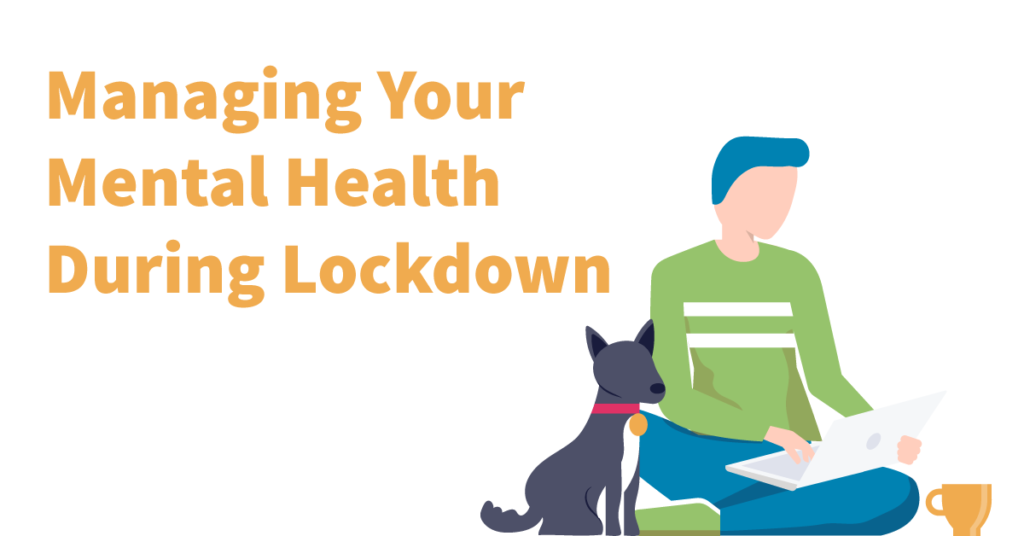This week is mental health awareness week, and with the current pandemic we want to take some time to give you some useful ways to take care of your mind and body whilst staying at home.

At the moment, you’re probably experiencing all kinds of emotions including, boredom, loneliness, being frustrated, anxious and concerned about your finances and your health, as well as the health of those around you – and this is completely normal. This is new to all of us, and there’s no ‘right’ way of doing things, but we do have some tips on how you can manage your mental health and wellbeing whilst staying at home.
The government also has wider guidance on staying at home as a result of coronavirus.
1. Learn about your employment and benefits rights
One of the first things that may have worried many of us is what can we do about working and staying financially stable when everything is so uncertain? If you’re employed, you should speak to your employer about your rights and if working from home is feasible, or find out what your benefit rights are. The government has introduced a Furlough scheme, you can find out more about that here.
Mind Charity has released a Mind @ Work resource to focus on mental health and your job.
2. Talk about your feelings
Talking about your problems could feel like a weight has been lifted off your shoulders, whether this is with a close family/friend, a colleague or a professional. It’s completely normal to feel worried and overwhelmed at the moment and your usual coping mechanisms may have been taken away from you. We have a list of free UK helplines to contact that offer a wide range of support.
3. Manage your news intake
Be cautious of how much time you are spending watching, reading, or listening to the news. This can have a negative impact on your mental health and can be very stressful for you to keep on top of. Consider turning off breaking-news notifications from your phone and muting certain profiles from your social media news feeds. Give yourself a set time throughout the day to catch up on the news instead of having a constant feed of it.
4. Plan in advance
With the strict lockdown rules, you should only be leaving the house for essential goods. With this in mind it’s useful to plan out how you are going to be getting household supplies and any food. Before you go to do your shopping, make a list and ensure you have everything you need on it to reduce the amount of trips you need to go out.
You should also prepare how to access any regular treatment and support you need, and any medicine that you may take.
Planning in advance for all of these things will give you peace of mind and reduce any further anxiety when it comes to leaving the house.
5. Look after your overall health
Our physical health has a big impact on how we feel, and in times when it feels that our normal routine is now completely useless, it’s easy to fall into unhealthy patterns and behaviour that will have a negative impact on your mind.
Try to maintain your regular sleeping pattern as sleep makes a big difference to how we feel. Ensure you are getting enough of this and try to stick to good sleep practices.
Try to eat healthy, well-balanced meals, drink enough water and exercise regularly. Avoid smoking or drugs, and try not to drink too much alcohol.
6. Stay connected
Even though you can’t see your friends and family in person, there’s so many ways we can stay in touch with them thanks to technology. Maintaining healthy relationships with the people you love is important for your mental wellbeing. By using your phone and social media apps, we can stay in touch and up-to-date with our loved ones as if we’ve never been apart from them.
As a company, we’ve taken to using Microsoft Teams to encourage people to video call colleagues opposed to picking up the phone, as the face to face (or should we say, screen to screen!) contact feels more like speaking to them in the office.
We’re all finding the current situation difficult and need each other more than ever.
7. Focus on what you can control
At the moment there are so many things that we are unable to control, but we need to accept that and focus on the things that are in our control.
Find things that you enjoy that you can still do inside. These will make you feel more positive about staying at home and give you a nice distraction. People are finding ways to do their usual favourite past times online such as hosting a virtual quiz, participating in a listening party with their friends. Also learning a new skill through a range of online tutorials or signing up to an online qualification.
As well as this, keep your mind active if you have the time. You can do things such as read, write, play games, do crosswords, complete sudoku puzzles, finish jigsaws, or try drawing and painting to stay focused.
8. Stick to a routine
This is something that we touched on in our blog about working from home – Effective Ways to Keep Morale & Productivity High, sticking to a regular routine and a plan will help to make things seem less chaotic. Take some time each week to plan what you need and want to do for the week ahead. Try to include things that keep you relaxed, such as a home workout, taking time to clean your living space, going for a walk, watching TV, reading or cooking your favourite meal. Having a routine set out for your week ahead will keep you motivated and may even give you some things to look forward to.
9. Take time to acknowledge and reflect on your feelings
As we’ve already mentioned, the whirlwind of emotions you’re probably feeling at the moment is completely normal. These feelings are probably having a negative effect on our life and it may seem like there’s nothing we can do about them, but it’s important to acknowledge that we are feeling these ways and accept that. Because these feelings are so new to many of us, you may think that it is best to bottle them up but that will result in negative long term effects. If you feel like you need to talk to someone about your thoughts and feelings, see a list of free UK helplines here.
If you have lost a loved one during this time, you can find guidance and support on grief and bereavement here.
10. Take time to rest
With nothing much to do but scrolling through social media, you probably see that your friends and family are sharing the ‘best bits’ of their lockdown. You might feel guilty for not doing a 5k run everyday or managing to cook up a fresh meal for the family every night. Don’t compare yourself to others – getting through each day is a good enough achievement. Take time everyday to rest and recoup. Try to practice mindfulness, there are many apps you can download that will give you step by step guides. This can help with difficult emotions and worries, and improve our wellbeing.
There are many resources on the NHS website for this.
Remember, that there is no ‘right’ way to get through this pandemic. You will find things that will help you stay positive and motivated and things that won’t. Focus on the good things and take it one day at a time, remembering that this will be over eventually. Look after yourself, and look after those around you.
If things seem too much, please reach out to either our designated safeguarding team or many of these helplines that offer free and confidential support.

